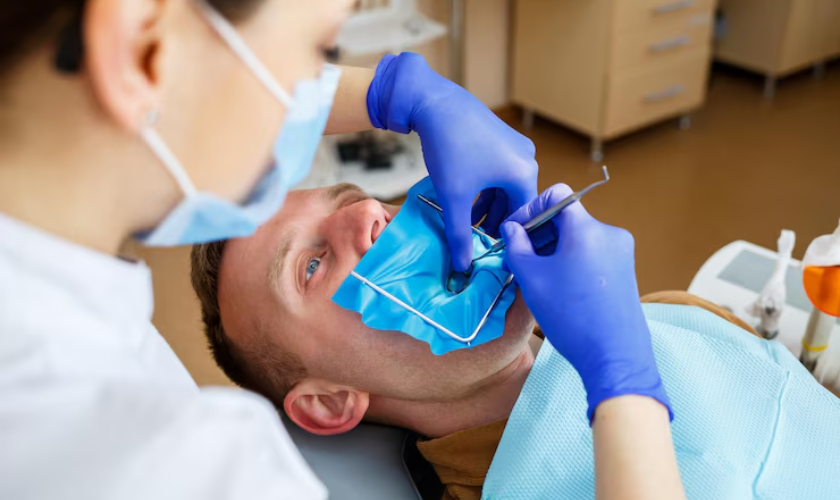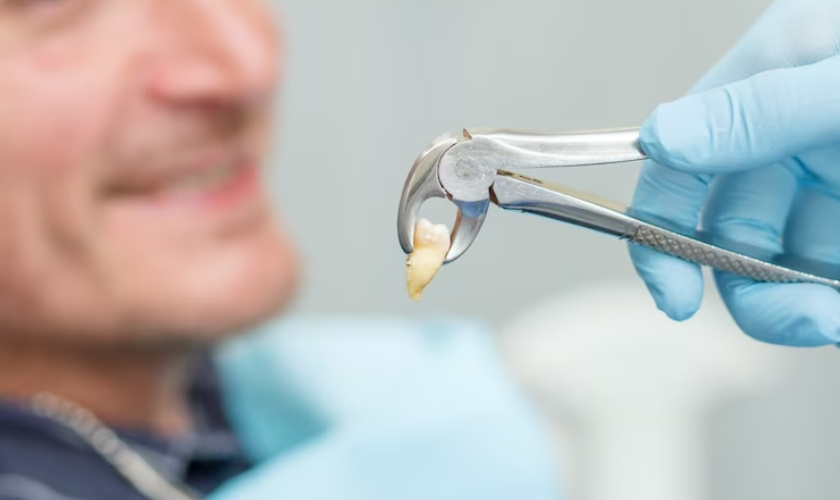We are not a registered Medicare/Medicaid Provider
Wisdom Tooth Extraction Aftercare: Dos and Don’ts

The journey to optimal oral health often involves undergoing dental procedures such as wisdom tooth extraction. While the removal of these third molars is a common and necessary procedure, proper aftercare is crucial to ensure a smooth and successful recovery.
Wisdom tooth extraction is typically recommended to alleviate pain, prevent overcrowding, and address various dental issues. However, the recovery process requires diligent attention and adherence to specific guidelines to minimize discomfort and reduce the risk of complications.
In this blog, we’ll explore the dos and don’ts of wisdom tooth extraction aftercare, equipping you with the essential knowledge to navigate the post-operative period with confidence.
By understanding the essential steps and precautions involved in post-extraction care, you can promote healing, prevent infection, and expedite your return to normal activities. Read on to learn about the intricacies of wisdom tooth extraction aftercare and discover how to navigate this pivotal phase of your dental health journey with ease.
Immediate Post-Extraction Care:
After wisdom tooth extraction, the immediate post-operative period is crucial for facilitating healing and minimizing discomfort. Here’s what you need to know:
Managing Bleeding and Swelling:
- Apply gentle pressure with clean gauze to control bleeding.
- Use ice packs or cold compresses to reduce swelling.
- Avoid vigorous rinsing or spitting to prevent dislodging blood clots.
Pain Management Techniques:
- Take prescribed pain medications as directed by your dentist.
- Use over-the-counter pain relievers such as ibuprofen or acetaminophen as needed.
- Follow any additional pain management instructions provided by your dentist.
Dietary Guidelines for the First Few Days:
- Stick to soft, easy-to-chew foods like yogurt, mashed potatoes, and smoothies.
- Avoid hot and spicy foods that may irritate the extraction site.
- Drink plenty of fluids, but avoid using straws, as suction can dislodge blood clots.
Oral Hygiene Practices
Maintaining proper oral hygiene is essential for preventing infection and promoting healing after wisdom tooth extraction. Here are some guidelines to follow:
Brushing and Flossing Instructions:
- Brush gently around the extraction site using a soft-bristled toothbrush.
- Avoid brushing directly on the extraction site for the first 24 hours.
- Resume regular brushing and flossing of other teeth after the first day, taking care to avoid the extraction site.
Use of Saltwater Rinses for Gentle Cleansing:
- Rinse your mouth gently with warm salt water starting 24 hours after the extraction.
- Mix a teaspoon of salt in a glass of warm water and swish it around your mouth for about 30 seconds.
- Saltwater rinses help cleanse the extraction site and reduce the risk of infection.
Avoidance of Vigorous Rinsing or Spitting:
- Avoid vigorous rinsing or spitting for the first 24 hours after the extraction.
- Excessive rinsing or spitting can dislodge blood clots and interfere with the healing process.
- Instead, allow saliva to gently pool in your mouth and swallow it naturally to minimize disruption to the extraction site.
Medication and Follow-up Appointments:
Proper Usage of Prescribed Medications:
- Take any prescribed medications as directed by your dentist or oral surgeon.
- Pain relievers and antibiotics may be prescribed to manage pain and prevent infection.
- Follow the dosage instructions carefully and complete the full course of antibiotics, even if you start feeling better.
Scheduling and Attending Follow-up Visits:
- Schedule and attend any follow-up appointments recommended by your dentist or oral surgeon.
- These appointments are crucial for monitoring healing progress and addressing any issues that may arise.
- Be sure to follow any post-operative instructions provided during these visits to ensure optimal healing.
Communication with the Dentist about Any Concerns:
- Don’t hesitate to contact your dentist if you experience severe pain, excessive bleeding, or signs of infection such as fever or swelling.
- Your dentist is there to help address any concerns or complications that may arise during the recovery process.
- Prompt communication with your dentist can help prevent complications and ensure a smooth recovery.
Activities and Lifestyle Adjustments:
Rest and Relaxation Recommendations:
- After wisdom tooth extraction, it’s important to prioritize rest and relaxation to aid in the healing process.
- Avoid strenuous activities, and take time off from work or school if possible to allow your body to recover.
- Get plenty of sleep and avoid excessive physical exertion to promote healing and reduce discomfort.
Limitations on Physical Activities:
- During the initial recovery period, it’s essential to avoid activities that could disrupt the healing process or increase the risk of complications.
- Refrain from vigorous exercise, heavy lifting, or activities that involve bending over, as these can increase blood flow to the surgical site and lead to bleeding or swelling.
- Gradually reintroduce physical activities as advised by your dentist or oral surgeon, starting with light exercise and gradually increasing intensity as healing progresses.
Avoidance of Smoking and Alcohol:
- Smoking and alcohol consumption can delay the healing process and increase the risk of complications after wisdom tooth extraction.
- Avoid smoking or using tobacco products for at least 72 hours following surgery, as smoking can impair blood flow and interfere with tissue healing.
- Similarly, refrain from consuming alcohol during the initial recovery period, as it can interfere with the body’s ability to heal and increase the risk of post-operative complications.
Potential Complications and Warning Signs:
Signs of Infection or Dry Socket:
- Watch out for symptoms such as fever, persistent pain, swelling, or foul-smelling discharge, which could indicate an infection.
- Dry socket, characterized by severe pain and exposed bone at the extraction site, may also occur. Contact your dentist if you experience these symptoms.
Dealing with Excessive Bleeding or Persistent Pain:
- Some bleeding is normal after wisdom tooth extraction, but if bleeding persists or becomes excessive, apply gentle pressure to the area using a clean gauze pad.
- Persistent or worsening pain may indicate complications such as infection or dry socket. Follow your dentist’s instructions for pain management and contact them if pain persists despite medication.
Importance of Contacting the Dentist for Prompt Treatment:
- If you experience any of the aforementioned symptoms or have concerns about your recovery, don’t hesitate to contact your dentist or oral surgeon.
- Prompt treatment of complications is crucial for preventing further problems and ensuring a smooth recovery process.
Long-Term Care and Recovery:
Gradual Healing Process Over Several Weeks:
- Wisdom tooth extraction recovery typically involves a gradual healing process that spans several weeks.
- Initially, you may experience improvements in swelling, discomfort, and oral function within the first week post-extraction.
- However, complete healing of the extraction site and surrounding tissues may take several weeks to months, depending on individual factors and the complexity of the extraction.
Resumption of Normal Diet and Activities:
- As healing progresses, you can gradually reintroduce solid foods into your diet, starting with soft, easy-to-chew options.
- Avoid hard, crunchy, or sticky foods initially to prevent irritation or damage to the extraction site.
- Gradually resume normal activities, including exercise and work responsibilities, as tolerated. However, avoid strenuous activities that may disrupt the healing process or cause discomfort.
Maintenance of Good Oral Hygiene for Overall Oral Health:
- Continue to practice good oral hygiene habits, including regular brushing and flossing, to promote healing and prevent complications.
- Be gentle around the extraction site when brushing to avoid irritating the area.
- Attend scheduled follow-up appointments with your dentist or oral surgeon to monitor healing progress and address any concerns or complications.
Proper care after wisdom tooth extraction is crucial for a smooth and successful recovery. By following the dos and don’ts outlined in this guide, you can minimize discomfort, reduce the risk of complications, and expedite the healing process. Remember to contact your dentist promptly if any concerns arise.



